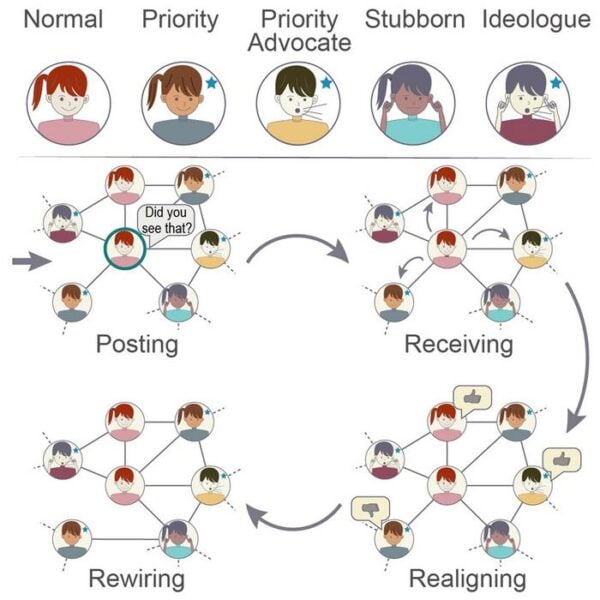Scientists have discovered that social media verification systems can significantly impact how opinions spread online, with verified users wielding outsized influence over public discourse and potentially driving increased polarization.
Summary: New research reveals how social media platforms’ verification systems can inadvertently increase polarization and create echo chambers, particularly when verified users hold extreme views. The study used computational modeling to examine the impact of verified users on opinion dynamics.
Reading time: 5 minutes
The Power of Verification
A new study published in iScience demonstrates that verified social media accounts can either promote consensus or deepen divisions, depending on the users’ behavior. “Our findings confirm that ideologues and verified users play a crucial role in shaping the flow of information and opinions within the social network,” explains Henrique Ferraz de Arruda, the study’s first author from George Mason University. “When verified people post things, it can reach more people, which allows them to have a significant impact on the formation and reinforcement of echo chambers.”
Impact of User Behavior
The research team found that verified users who remain flexible in their opinions can actually help build consensus. However, when verified users become “ideologues” – users with firmly entrenched opinions – they can accelerate polarization within the network. This effect becomes particularly pronounced when these ideologues hold extreme views.
“We found that even centrist ideologues, who may appear as a moderating force on the surface, can have a significant impact on the opinion dynamics when in enough numbers,” says Arruda.
Network Dynamics and Information Flow
A key finding reveals how user connections reshape themselves over time. As the study explains, “When the number of ideologues in the network becomes sufficiently large, regardless of whether they exhibit centrist or extremist behavior, we observed that a significant portion of the messages exchanged in the network are either sent to or received from these influential users.”
Glossary of Terms
- Echo chamber: Online space where similar opinions are amplified while opposing views are minimized
- Ideologue: User with firmly held beliefs resistant to change
- Polarization: Division of opinions into opposing extremes
- Verification: System for confirming user identity and granting special privileges
- Network dynamics: How connections between users change over time
- Algorithm: Set of rules determining content visibility and distribution
Quick Quiz
- What determines whether verified users increase or decrease polarization?
- How do extreme ideologues affect social networks?
- What happens to message flow when there are many ideologues in the network?
Answers:
- Their flexibility or stubbornness in opinions
- They accelerate polarization and create echo chambers
- Most messages become concentrated around these influential users
Enjoy this story? Get our newsletter! https://scienceblog.substack.com/
Further reading: DOI: 10.1016/j.isci.2024.111098
If our reporting has informed or inspired you, please consider making a donation. Every contribution, no matter the size, empowers us to continue delivering accurate, engaging, and trustworthy science and medical news. Independent journalism requires time, effort, and resources—your support ensures we can keep uncovering the stories that matter most to you.
Join us in making knowledge accessible and impactful. Thank you for standing with us!

